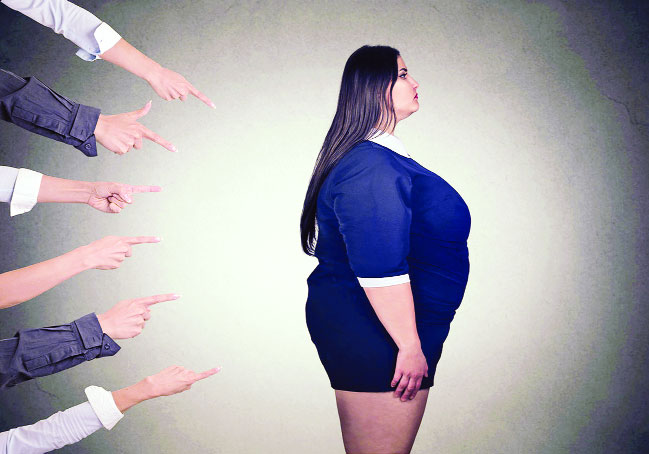Irrespective of whether you’re fat or thin, body shaming has plagued many people. The only way to overcome it is by talking about it. By Aishwarya Sharma
Body shaming — these two words say a lot about their intent. In fact, it has become a serious issue in our society today. Technically, body shaming is defined as inappropriate, negative statements and attitudes toward another person’s weight or size but it is so much more than that. It is one of the mos0t serious form of bullying, harassment and humiliation and usually experienced by women more than men.
In an age where mainstream media and social media are easily accessible, there is a strong emphasis on idealised beauty on platforms such as Instagram, magazines and television. When we look at celebrities and models who are believed to have ‘perfect bodies’, individuals start becoming critical of their own bodies and succumb to the pressure of living up to unrealistic standards. Studies show that more than 90 per cent women are not happy with the way they look. Where do you think this self-rejection comes from? Why do you think these women and girls are becoming more and more conscious about how they look, what they wear and what skin color they have.
With global celebrities coming out and breaking their silence on their experiences of body shaming in the industry, it has become one of the most talked about things recently. Despite their status, some celebrities have had to deal with body shaming, from comments left on their social media pages, to having Photoshop applied to their pictures for magazine covers. Mad Men actress Christina Hendricks recently spoke out about being rejected for a role for being too curvy. Priyanka Chopra spoke about being rejected for her skin color in a lot of Bollywood and Hollywood films. This is a point where we realise that no matter who you are, body shaming is something which follows you everywhere and engulfs everyone.
Statements like “You are so fat”, “You should probably try to gain weight”, “Your parents don’t feed you?”, “Your top is too short for your belly” which can come from complete strangers or your family member can create a feeling of helplessness and humiliation for the one at the receiving end. You, I and others, we all have gone through it. We all have had people who told us how inappropriate we look in a certain dress because we have chubby thighs, belly fat, short legs or because we are simply stick thin. Eventually, we start feeling that we aren’t enough.
Experts say “Psychological invalidation is one of the most lethal forms of emotional abuse and body shaming is the worse thing you can do to a person. It kills creativity and confidence of the individual.”
Body shaming is universal. When we say that, we mean that shaming can come from anywhere and from anyone. It could be out of concern or to demean the other person. Sometimes, it can be internal too. Studies show that a lot of women have resigned to self-shaming. They keep shaming themselves because they think they aren’t like the girls in the magazines. Magazines constantly offer tips about ‘how to lose weight in days’, ‘appear slimmer instantly’, and ‘hide our imperfections’…without actually knowing anything about us, much less our appearance. This is only one example of body shaming in media. There are sitcoms that frequently use overweight actors’ bodies as the basis of jokes.
However, people today are more outspoken about their struggles and stories and when we are made aware of them we realise how important it is to actually let it out instead of let it kill you from inside. Nobody wants to go to bed crying and wake up with a feeling of not being enough and it’s unimaginable as to how many people experience that each day. Important questions are who are these people?, why do we care about what they say? and why are we detesting ourselves because someone else is not comfortable? It has become essential to represent different bodies, races and skin colours.
(The writer is a fashion activist.)


























